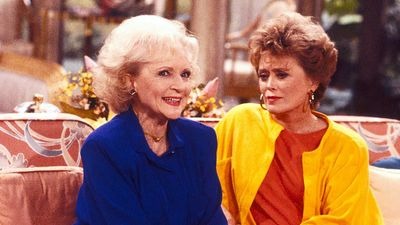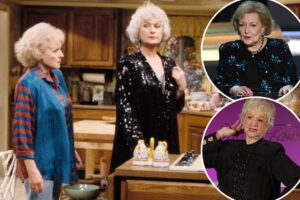
“The Golden Girls,” a beloved sitcom that aired from 1985 to 1992, has left an indelible mark on television history. At the heart of the show was Bea Arthur’s unforgettable portrayal of Dorothy Zbornak, a character that resonated with audiences for her sharp wit, intelligence, and no-nonsense attitude. However, what many fans may not know is that the journey to bring Dorothy Zbornak to life was fraught with challenges, particularly from NBC executives who initially resisted casting Arthur in the role. This article explores the significance of Dorothy Zbornak, the initial hesitations of NBC, and the lasting impact of Bea Arthur’s performance.
The Golden Girls: A Groundbreaking Concept
“The Golden Girls” was created by Susan Harris and centered around four older women—Dorothy, Rose (Betty White), Blanche (Rue McClanahan), and Sophia (Estelle Getty)—living together in Miami. The show broke new ground by addressing issues related to aging, friendship, and the challenges faced by women in their golden years. It tackled topics such as love, loss, and sexuality with humor and grace, making it relatable to a diverse audience.
Dorothy Zbornak, portrayed by Bea Arthur, was the intellectual backbone of the group. Her character often served as the voice of reason, delivering biting sarcasm and sharp commentary that contrasted beautifully with the more whimsical personalities of her roommates. The dynamic between Dorothy and her friends created a rich tapestry of humor, drama, and heartwarming moments.
Bea Arthur: A Force of Nature

Before “The Golden Girls,” Bea Arthur had established herself as a formidable talent in television and theater. Known for her deep voice and commanding presence, Arthur had already garnered acclaim for her role in “Maude,” a groundbreaking sitcom in its own right. Her experience and talent made her a natural fit for the role of Dorothy, but not everyone saw it that way.
NBC executives had reservations about casting Arthur, fearing that her established persona from “Maude” might overshadow the character of Dorothy Zbornak. They were concerned that audiences would struggle to separate Arthur from her previous role, which could hinder the show’s success. Additionally, there was a prevailing belief at the time that older actresses could not attract younger viewers, leading to doubts about the show’s potential.
The Fight for Dorothy
Despite the executives’ hesitations, creator Susan Harris and other key players in the production were determined to cast Bea Arthur as Dorothy. They recognized that Arthur’s talent and unique comedic style would bring depth and authenticity to the character. The creators believed that her strong presence would not only enhance the show but also challenge the stereotypes surrounding older women in television.
The battle to secure Arthur’s role was intense. Susan Harris and the show’s producers fought hard to convince NBC that casting Arthur was essential for the show’s success. They argued that her experience and comedic sensibility would resonate with audiences and that the character of Dorothy Zbornak would become a beloved figure in television history.
Ultimately, the producers’ persistence paid off, and Bea Arthur was cast as Dorothy Zbornak. What followed was a cultural phenomenon that not only showcased the talents of its cast but also redefined the representation of older women on television.
The Impact of Dorothy Zbornak

Once “The Golden Girls” premiered, it quickly became clear that casting Bea Arthur was a brilliant decision. Dorothy Zbornak emerged as a standout character, known for her quick wit, strong opinions, and occasional vulnerability. Arthur’s ability to deliver both comedic and poignant moments made Dorothy relatable and endearing to viewers of all ages.
The character tackled various issues, from divorce and single motherhood to the challenges of aging, all while maintaining a sense of humor. This portrayal resonated with audiences, who cherished the authenticity and depth that Arthur brought to the role. Dorothy’s relationships with the other characters, particularly her mother Sophia, were filled with warmth and humor, showcasing the complexities of family dynamics.
Through her portrayal of Dorothy, Bea Arthur became an advocate for older women, challenging societal norms and expectations. The show demonstrated that women in their later years could be vibrant, funny, and relevant, paving the way for future representations of older characters in television.
The Legacy of “The Golden Girls”
“The Golden Girls” has been lauded for its groundbreaking approach to storytelling and its ability to address important social issues while maintaining a comedic tone. The show has received numerous awards, including several Emmy Awards, and continues to be celebrated in popular culture. Its themes of friendship, empowerment, and resilience remain timeless, resonating with new generations of viewers.
Bea Arthur’s performance as Dorothy Zbornak is often cited as one of the most iconic roles in television history. Her ability to balance humor with sincerity made the character a beloved figure, and her legacy endures through reruns, merchandise, and fan tributes. Arthur’s influence can still be felt in contemporary television, where strong, complex female characters continue to emerge.
Conclusion: A Triumph of Casting
The story of Bea Arthur’s casting as Dorothy Zbornak serves as a reminder of the importance of fighting for representation and authenticity in the entertainment industry. The initial resistance from NBC executives highlights the challenges that often accompany groundbreaking projects, but in this case, persistence won out.
Dorothy Zbornak became a symbol of strength, intelligence, and humor, and her legacy is a testament to Bea Arthur’s talent and the groundbreaking nature of “The Golden Girls.” The show’s impact on television and culture is profound, and its message about the richness of life at any age continues to inspire audiences today. Bea Arthur’s portrayal of Dorothy Zbornak was, indeed, perfection, and it is one that will remain etched in the hearts of fans for generations to come.
